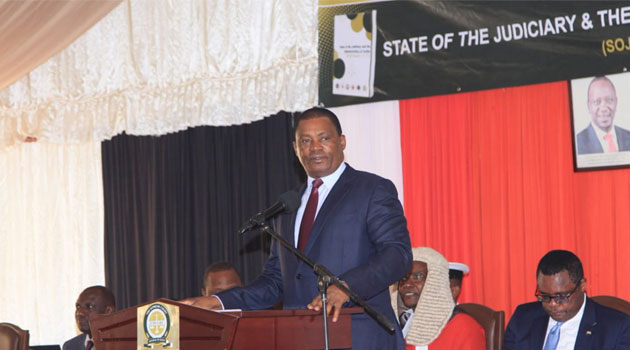
Muturi who spoke during the launch of the 2017/18 State of the Judiciary and Administration of Justice (SOJAR) said the now common publicity stunts by agencies leading in the purge against graft were unhelpful/COURTESY
NAIROBI, Kenya, Feb 28 – National Assembly Speaker Justin Muturi has urged investigating agencies to desist from publicizing impending arrests of officials suspected to be involved in corruption and instead focus on crafting watertight cases.
Muturi who spoke during the launch of the 2017/18 State of the Judiciary and Administration of Justice (SOJAR) said the now common publicity stunts by agencies leading in the purge against graft were unhelpful.
“Don’t compete for news headlines; allow us the political class to do that. If you intend to investigate or arrest Justin Muturi just come and arrest him don’t tell the world that you’ll be arresting him in a week or two,” he said during the launch on Thursday.
In comments apparently directed at the Ethics and Anti-Corruption Commission (EACC) and the Directorate of Criminal Investigations (DCI), Muturi said the agencies should instead emulate the Judiciary where matters before court are not unnecessarily publicized.
He commended the Judiciary for focusing on its mandate and refraining from unvaluable quest for public attention.
“Unlike many institutions such as the one I work in where we scream for headlines or compete for them, the Judiciary is a unique arm of government; it speaks through its judgments,” Speaker Muturi noted.
“We’re never able to tell what is going to be pronounced until it is pronounced. Those that support the Judiciary should emulate that practice,” he urged.
The EACC and DCI have recently adopted an aggressive publicity campaign with television crews often tipped off to cover dramatic arrests of government officials said to be involved in graft.
During the national anti-corruption conference on January 25, Chief Justice David Maraga specifically singled out the dramatic arrests usually conducted on Fridays saying the anti-graft war will not be won by staging publicist antics.
“We’re not going to win the war against corruption by Friday arrests and I want our police to stop that. We’re now sidetracked hearing petitions which ordinarily we should not be hearing so that we focus on actual cases,” he said.
Maraga at the time faulted the Director of Public Prosecutions Noordin Haji for what he termed as poorly drafted charge sheets that often prolong hearings.
“Mr Haji, look at the way you frame cases. You put thirty persons on a single charge sheet and they are represented by thirty lawyers. How long do you think that will take?” he posed.
Maraga also accused the police of mishandling evidence.
“A police officer is charged with murder using a firearm. The case is investigated by very senior police officers but when they come to court knowing very well the firearm is central to the case they come with a wrong serial number,” he elaborated.
Following the public rebuke, weekend arrests have since subsided even as Maraga instituted a wide-ranging reforms to address concerns raised at the corruption conference.
The Chief Justice has since reshuffled dozens of Court of Appeal and High Court judges in what the Judiciary has termed normal transfers conducted in accordance with transfer policy guidelines adopted in December 2017.
On Thursday Maraga refuted claims that these reorganizations were unduly influence by the Executive saying the Judiciary retained its independence.
The CJ said tremendous progress had been made in the fight against corruption saying a total of 91 graft cases had been concluded between January 2017 and December 2018, 46 of these resulting into convictions.
The Judiciary posted an 87 per cent competition rate of case backlog dating five years and above.
Maraga promised to ensure some 91 pending corruption cases are expedited and concluded in a timely manner.
In his SOJAR 2017/18 address, the Chief Justice reported the conclusion of over 148,000 cases between January 2017 and December 2018.
“The number of cases which were more than five years old was 170,186. Between January 2017 and December 2018 we resolved a total of 148,877 of those cases and that works to 87 per cent success,” he said.
Maraga said an additional 611,948 cases were cleared during the same period, the Judiciary now aiming at clearing cases within at most three years.
“As we cleared the cases some graduated to the category of cases that are older than five years. We aim to clear them by the end of this year despite a steady increase in the number of cases being filed,” he said.
Maraga however called for funding to increase the number of judges, the Court of Appeal and the Environment and Lands Court (ELC) being the hardest hit.
“In the ELC, for instance because of the number of judges we have, one cannot get a hearing date this year because the diary is full. The Court of Appeal has nineteen judges against the set minimum number of thirty,” he noted.









































